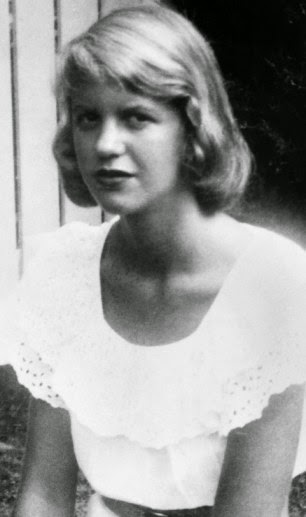I came of age in the 1970s. I never questioned whether I would have a career or children. I always knew that I could and would have both. I've always said that, much as I love history and historical fiction, I would have gone crazy had I actually been born earlier than when I was born.
Now, after reading Sylvia Plath's autobiographical novel, The Bell Jar, I'm starting to see things a little less black and white. The Bell Jar was published in January 1963, less than a month before Plath committed suicide, and the novel is a fictionalized account of her life ten years earlier, when she was in college, worked as a summer editor at Mademoiselle magazine, and ended up in a hospital where she received electroshock treatments and psychotherapy after several suicide attempts.
What makes me question my long-held truths after reading this sad book is that Plath's mental illness was not a result of her being out of step with her time and place. She was mentally ill, despite her manifold gifts as a writer. The treatment she received relieved the pressure of the bell jar, for a time, but in reading this book, I felt that her final act was inevitable. That made me sad, of course, but also it made me realize that Plath would have suffered from mental illness even if she hadn't been reared in a world where not many women successfully did "have it all." In a way, her indecision about which path she wanted her life to take was a manifestation of her mental state not necessarily a condemnation of the world in which she lived. I'm not defending the world that Betty Frieden railed against in The Feminine Mystique--it needed to be changed--but Plath wasn't really a victim of that world as much as she was a chronicler of it.
Reading The Bell Jar made me wonder if I really would have been "crazy" had I lived in a different time. Much of what I believe is a result of the world in which I grew up. Had I lived in a different time, nurture would have been different, but not nature. Maybe that's what I'm getting to--Plath's nature (her inherent mental instability) became the defining feature of her life, overwhelming her incredible poetic talent and the nurturing home she tried so hard to disconnect herself from.
Speaking of her poetic talent, I found The Bell Jar to be okay--I read it primarily because of its place in American literature. There's an immaturity in the voice that I found irritating. Much as I admire Plath as a poet, I did not like or even really sympathize with Esther Greenwood, her 1st person narrator in The Bell Jar. I liked the metaphor of the bell jar, but overall I found her prose riddled with cliches and more drab than not.
I'm glad I read it--it was an interesting experience--and I'm ready to move on.
 |
| Sylvia Plath |
Yeah, The Bell Jar is the fifth book read in 2014 from my TBR Pile Challenge, and my "Author who is New to Me" category in the Back to the Classics Challenge.


I was hooked after reading Sylvia Plath's autobiographical novel. I couldn't stop thinking about her and started reading/watching whatever I could find. Have you seen the film Sylvia? Not a masterpiece but so touching. I've written about Sylvia Plath at Fly High and Learn Online, and she's one of the American authors I often incluce in my syllabus for last year students. Thanks for sharing your impressions and thoughts.
ReplyDeleteActually, it was this post of yours that made me even put The Bell Jar on my reading list. I haven't watched Sylvia, but still mean to.
DeleteIt's the video you did of Richard Armitage's reading of Ted Hughes's letter to Sylvia's mother. I still think the video/reading is just amazing.
http://flyhigh-by-learnonline.blogspot.com/2009/07/i-didnt-know-how-to-start-this-letter.html
I tried to read her journals once, but had to stop after awhile...they were just so depressing and dark. She did not dwell in a happy place mentally or emotionally. I thought this book was okay; I'm glad I read it, but it'll never be a favorite. I do like her poetry, though.
ReplyDeleteI think I wouldn't do well reading her journals either. I find her poems dark as well, but somehow that's okay. I particularly like "Wuthering Heights."
DeleteThought provoking review. I have been wondering if I'm a little too old to really appreciate this one now. Another review suggested it was best read in one's 20's...?
ReplyDeleteI know the feeling, which is why I still haven't read The Catcher in the Rye--I think the window for me liking it closed awhile ago.
DeleteThought proving commentary Jane.
ReplyDeleteI really want to read this one. The fact that it got you thinking about yourself is in my opinion, one very important reason to read.
I agree, when one looks at the past it seems unimaginable to live there. Yet we are applying our own, present day experiences to that judgment. Folks living in the future will likely feel the same way about our times.
Based on your commentary, it seems that this book also has some very important things to say about mental illness.
The foreward to the version I read, by Frances McCullough, says that "Although her illness was never actually diagnosed, several researchers in the field have noted Plath's unerring description of schizophrenic perception...Plath's vivid, entirely rational, almost steely description of that world remains true and uneclipsed by any later writer."
DeleteI kept that in mind as I read the book, and I have to admit it made for chilling reading.